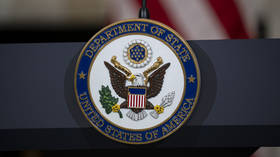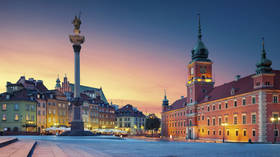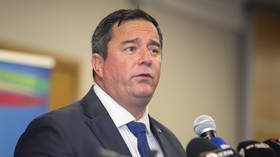ROAR: Lithuania still fighting “Soviet occupation”

New legislation in Lithuania stipulates criminal punishment for public justification or denial of international crimes, including the “aggression by the USSR” or Nazi Germany against the country.
The Lithuanian parliament has approved amendments to the Criminal Code that also mention “grave crimes committed in 1990-1991 against Lithuania and its people.” Those justifying or denying actions interpreted as crimes in the legislation will face a fine or a prison term, the parliament’s press service said.
“History has become a hostage to ideology in Lithuania,” Vremya Novostey daily said. The parliamentarians approved the amendments on the day when the country marked the 70th anniversary of “the beginning of Soviet occupation of Lithuania.” Many events, including a special meeting of the parliament, were dedicated to this anniversary.
On June 14, 1940, the Lithuanian government unconditionally accepted an ultimatum from the Soviet Union and allowed Soviet soldiers to enter the country. In the document, the USSR had accused the Baltic country of violating the Soviet–Lithuanian Mutual Assistance Treaty of October 1939.
Later, the people’s government was formed and the country’s parliament proclaimed the Lithuanian Soviet Socialist Republic, which was incorporated into the USSR. The events were in line with the division of Eastern Europe into the German and Soviet spheres of influence following the Molotov–Ribbentrop Pact, signed in August 1939.
“Lithuanian historians and politicians still argue why ‘occupants’ were allowed into the country without a single shot and why the ultimatum was accepted without any conditions,” Regnum said.
Only five deputies of the 141-seat parliament voted against the amendments, the paper noted. “They believe that history should not be used as a source of disagreements,” it noted.
According tot the paper, Deputy Julius Veselka stressed that historians should study the sources of communism and Nazism, and people should be judged by their actions rather than statements.
The amendments stipulate charges for statements made in an insulting manner and accompanied by threats or public disorder. Deputy Rimantas Smetiona, another opponent of the legislation, asked if those who doubted particular international crimes “politely and with a smile” would not be held responsible, the paper said.
Vilija Aleknaite Abramikiene, the author of the draft bill, stressed that the Lithuanian version of the amendments was more liberal than similar laws adopted in Poland, the Czech Republic and Hungary, the paper said.
It was Abramikiene who initiated the ban on the public use of Soviet symbols and submitted the resolution that equated fascism with Stalinism, the paper said.
The display of both Nazi and Soviet symbols is forbidden in Lithuania. But a court recently acquitted students using a swastika at a parade, ruling out that it was not exclusively a Nazi emblem.
Lithuania was the first republic of the former Soviet Union to declare independence in 1990. Many Lithuanians consider the USSR and Nazi Germany as occupants. Vilnius has been demanding for ten years that Russia, as successor of the Soviet Union compensate for “damage caused by the occupation.”
Russian President Dmitry Medvedev said on May 7 that Germans behave “more worthily than, say, some representatives of the Baltic States,” in assessing events leading to the WWII.
“Nobody idealizes the role of the Soviet Union in the postwar period,” the president said. But those who “put the Red Army and fascist invaders on the same level are committing a moral crime,” he added.
Lithuania will mark the anniversary of the 1940 events till the end of the week. However, President Dalia Grybauskaite, unlike many politicians, did not mention the word “occupation” in her speech on June 14, Regnum news agency said. She also stressed that people of different origins suffered during mass deportations to the Soviet Union, the agency added.
At the same time the Lithuanian parliament on June 1 adopted a resolution supporting Georgia’s territorial integrity, “despite the fact that the country’s Foreign Ministry asked the deputies not to do this,” Moskovsky Komsomolets daily said.
“Russia’s actions during the armed conflict with Georgia got the toughest assessments, and Abkhazia and South Ossetia were recognized as occupied territories,” the paper added. Thus, Lithuania has become the first European country to pass such a resolution in response to Tbilisi’s request.
The deputies passed this pro-Georgian legislation on the eve of the arrival of Russian delegation to Vilnius for the meeting of the Council of the Baltic Sea States (CBSS). Viktor Zubkov, the first deputy prime minister and head of the delegation, stressed that the resolution “distorted all the facts of the August 2008 events.”
The CBSS meeting was held “against a background of anti-Russian campaign launched by Lithuanian politicians,” Izvestia daily said. Many of them were offended by the fact that Russian Prime Minister Vladimir Putin did not take part in the event. “But nobody noted that only six of 11 member states of the Council were represented by heads of governments,” the daily noted.
The mayor of Vilnius’s office had also prepared for the meeting, proposing that citizens stop using Russian gas, but scheduled the start of the action only for 2015, Izvestia said.
However, despite the passions, the forum – as per previous ones – was held in a proper manner, the daily noted. “Russia is interested in thoughtful discussion about constructive initiatives aimed at co-operation in the Baltic region,” it quoted Zubkov as saying.
“The region has a huge potential for development,” the first deputy prime minister said. “If we use it competently, organize co-operation as partners and get rid of stereotypes and fears of the past, we will achieve success.”
Sergey Borisov,
Russian Opinion and Analysis Review, RT














